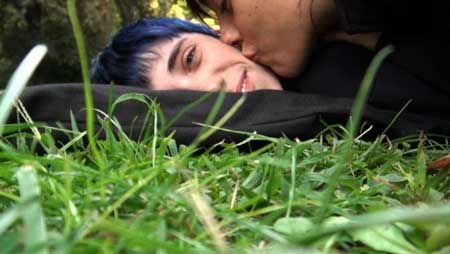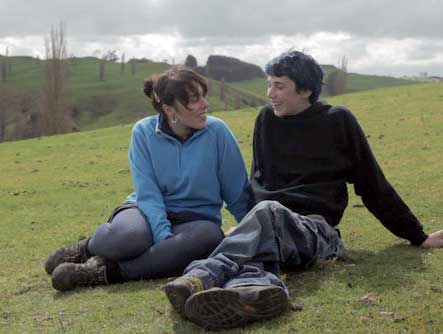Film (2013)
Directed by Marcel Barrena
Paramount Center
ReelAbilities Film Festival (February 19 – March 2, 2015)
Boston, MA
With Albert Casals, Anna Socías, Àlex Casals
Lecture and Discussion with
Richard Greenberg, Michigan Supreme Court
Jason Harris, Jason’s Connection

in “Little World”
Irrepressible, exuberant, endlessly amused and amusing, Albert Casals is a virtual tornado of optimism. Having lost use of his legs as a child from chemotherapy to treat leukemia, Albert travels in a wheelchair, but nothing slows him down. Having already traveled widely by the age of twenty, his goal, and the subject of this wonderful documentary, is to go to the location exactly at the opposite point of the globe from his home in Barcelona. That place turns out to be a lighthouse on the northwest corner of New Zealand.
A major voyage in any case, and even more so with wheelchair, Albert sets himself yet another guideline – he travels with virtually no money, relying solely on his wits and on the generosity of others. Amazingly, he has, by the time of this adventure, made it successfully to so many places in this way that the goal of getting to New Zealand on no money does not seem preposterous.
Adding to the fun and to the romance is Anna, Albert’s delightful girlfriend, not in a wheelchair, who accompanies him for much of the journey. Together they make an incredible pair as they hitch, camp, improvise, make friends, receive donations, and somehow manage to wend their way across the Middle East, the Far East and into the South Seas.
At every turn, Albert, an exponent of the most deliberate positive thinking, keeps driving them on, happily, sweetly, full of charmed laughter. The two of them invariably are taken in by all sorts of people. It is no wonder. Albert is a virtual rolling love machine, always dispensing positive energy, and his sweet, adolescent romance with Anna, who is almost as adventurous, is doubly charming to behold.
At one point en route Albert almost dies from some sort of mysterious attack which leaves him breathless, but with a lucky turn he recovers, only adding to his determination to continue on and to juice every bit of energy out of the remaining journey.
Albert’s father, a wonderfully decent and caring parent who raised Albert alone from early childhood after his wife died, Albert’s stepmother, who entered the scene some years afterwards, and his grandmother, weigh in on the whole Albert phenomenon. They all agree that, despite worrying endlessly, they must let Albert do his thing, to live the life he wants and needs to live.

in “Little World”
One can easily see, despite some roughness in its production, how it has won numerous awards at various film festivals. Filmed to a considerable extent by Anna and Albert on the road using a hand video camera, the results are quaint, folksy, down to earth, and entirely riveting.
Little World opened the ReelAbilities Boston Film Festival at the Paramount Theater at Emerson College on Monday, February 23rd. Running through March 2nd at various locations in the greater Boston area and in Springfield, ReelAbilites Boston features films about various forms of disability. Operating closely in conjunction with the Boston Jewish Film Festival, ReelAbilities began in a Jewish Community Center in Manhattan seven years ago and has spread to fourteen cities nationwide. ReelAbilities Boston is in its fourth year.
After the screening of Little World, Jason Harris, who has a mild form of autism and runs a nonprofit called Jason’s Connection that helps to serve the disabled community, and Richard Bernstein, blind from birth and newly elected to the Supreme Court of Michigan, spoke and answered questions.
Both incredibly spirited and positive, much in the same mode as Albert Casals, Harris and Bernstein emphasized the need to accept one’s condition straightforwardly and to move forward from there.
“The one great power we have,” said Bernstein, “is how we react to the fate we’ve been given.” Pointing out that disability and the challenges it poses can certainly enhance life, he emphasized that the “the easiest life is not always the best life.”
As well as being a highly successful jurist, Bernstein is also an athlete, having completed seventeen marathons and an Ironman triathlon. When training in New York’s Central Park some years ago, he was hit from behind by a cyclist traveling at 35 mph. Having to spend ten weeks recuperating in the hospital, Greenberg noted the signficant new challenges of dealing with chronic pain.
Both Harris and Bernstein stressed the need to provide a balance between caution and adventure, but, despite the obvious risks involved, underscored the importance of leaning towards adventure.
“My parents let me do my thing, and I really appreciated that,” said Harris.
“In the end, put the balance on the side of independence,” added Bernstein.
Both Harris and Bernstein lit up the room with their own thoughtful and honest forms of exuberance, demonstrating vividly how significant is the power of positive attitude and unremitting determination in overcoming the challenges of disability.
An inspiring evening all around.
– BADMan
Leave a Reply